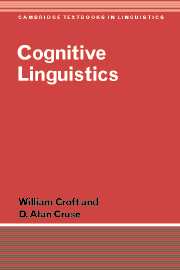1 - Introduction: what is cognitive linguistics?
Published online by Cambridge University Press: 05 June 2012
Summary
Cognitive linguistics is taken here to refer to the approach to the study of language that began to emerge in the 1970s and has been increasingly active since the 1980s (now endowed with an international society with biennial conferences and a journal, Cognitive Linguistics). A quarter century later, a vast amount of research has been generated under the name of cognitive linguistics. Most of the research has focused on semantics, but a significant proportion also is devoted to syntax and morphology, and there has been cognitive linguistic research into other areas of linguistics such as language acquisition, phonology and historical linguistics. This book can only outline the basic principles of the cognitive linguistic approach and some of its more important results and implications for the study of language. In this chapter, we briefly describe the major hypotheses of cognitive linguistics (as we see them), and how we will develop these hypotheses in the rest of the book.
We see three major hypotheses as guiding the cognitive linguistic approach to language:
language is not an autonomous cognitive faculty
grammar is conceptualization
knowledge of language emerges from language use
These three hypotheses represent a response by the pioneering figures in cognitive linguistics to the dominant approaches to syntax and semantics at the time, namely generative grammar and truth-conditional (logical) semantics. The first principle is opposed to generative grammar's well-known hypothesis that language is an autonomous (indeed, innate) cognitive faculty or module, separated from nonlinguistic cognitive abilities.
- Type
- Chapter
- Information
- Cognitive Linguistics , pp. 1 - 4Publisher: Cambridge University PressPrint publication year: 2004



